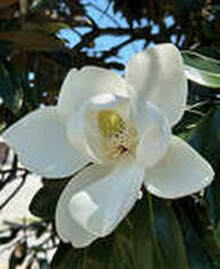BASIC CARE OF A LIVE OAK
1. Do not cover the roots of a live oak within a 15 feet radius nor cover the roots with fill to no more than one quarter of the way around the tree. The roots will smother and the tree will die a slow death. Avoid parking vehicles under an oak as it compacts the soil and smothers the roots.
2. Add mulch around your tree to allow air and nourishment to help the tree with its life process. However, do not pile mulch against the trunk of the tree. A gentle slope of mulch outward from the base of the tree is proper. Do not create a volcano effect with mulch, as it can do more harm than good.
3. If a live oak has been damaged by construction work or drought it is helpful to give the tree a dose of root stimulator (note, this is different from regular fertilizer). It is not necessary to fertilize a live oak except when first planted in order to give it a good start. Fertilizer will do more harm than good to a stressed tree. Mulch it instead and water it occasionally, but heavily during droughts, soaking the entire root zone under the tree’s crown canopy.
4. If your tree’s canopy is very thick, you may wish to have an ISA-certified professional arborist open up the canopy to allow light and air to flow. If moss gets too thick, it may also need thinning to allow air to circulate more freely. Resurrection fern will not harm your oak; it will only enhance its beauty.
5. Never have your tree topped (“dehorned”) or lion-tailed (thinned excessively, leaving only the outer branches). A good arborist will prune it so carefully that when he is gone it will be difficult to tell that he was even there.
6. Do not drive nails into a live oak. If hanging a swing or tire swing, insert the chain or rope into a rubber tube or cushioned protection layer to prevent wear on the branches and inspect the device annually to make sure it is not rubbing or strangling the limbs as the tree grows larger.
7. Do not whitewash the tree. It is one of the rules of the Live Oak Society.
8. If the tree is in a low area where the drainage pattern has changed and water sits for weeks at a time, provide for better drainage as the oak’s roots can smother in water.
9. Be very careful with herbicides. A tree is just a big, broad-leaf weed to a lawn weedkiller.
10. Watch your tree for any signs of declining growth rate or crown die-back as these are symptoms of root problems which often can be treated successfully by a certified arborist if attended to early.
2. Add mulch around your tree to allow air and nourishment to help the tree with its life process. However, do not pile mulch against the trunk of the tree. A gentle slope of mulch outward from the base of the tree is proper. Do not create a volcano effect with mulch, as it can do more harm than good.
3. If a live oak has been damaged by construction work or drought it is helpful to give the tree a dose of root stimulator (note, this is different from regular fertilizer). It is not necessary to fertilize a live oak except when first planted in order to give it a good start. Fertilizer will do more harm than good to a stressed tree. Mulch it instead and water it occasionally, but heavily during droughts, soaking the entire root zone under the tree’s crown canopy.
4. If your tree’s canopy is very thick, you may wish to have an ISA-certified professional arborist open up the canopy to allow light and air to flow. If moss gets too thick, it may also need thinning to allow air to circulate more freely. Resurrection fern will not harm your oak; it will only enhance its beauty.
5. Never have your tree topped (“dehorned”) or lion-tailed (thinned excessively, leaving only the outer branches). A good arborist will prune it so carefully that when he is gone it will be difficult to tell that he was even there.
6. Do not drive nails into a live oak. If hanging a swing or tire swing, insert the chain or rope into a rubber tube or cushioned protection layer to prevent wear on the branches and inspect the device annually to make sure it is not rubbing or strangling the limbs as the tree grows larger.
7. Do not whitewash the tree. It is one of the rules of the Live Oak Society.
8. If the tree is in a low area where the drainage pattern has changed and water sits for weeks at a time, provide for better drainage as the oak’s roots can smother in water.
9. Be very careful with herbicides. A tree is just a big, broad-leaf weed to a lawn weedkiller.
10. Watch your tree for any signs of declining growth rate or crown die-back as these are symptoms of root problems which often can be treated successfully by a certified arborist if attended to early.

